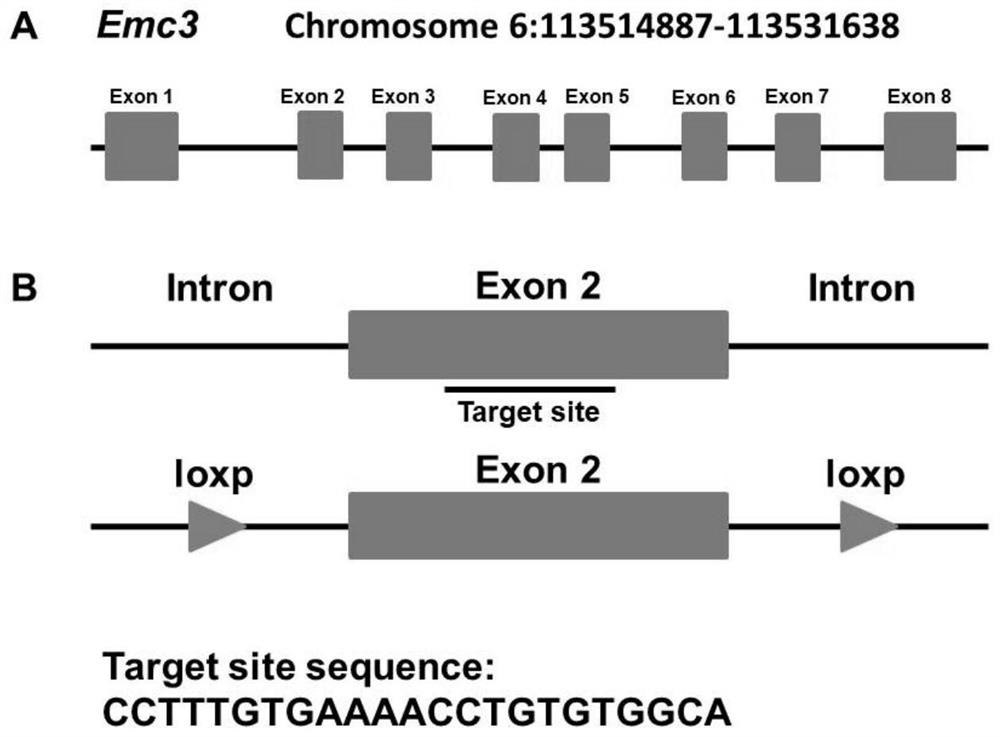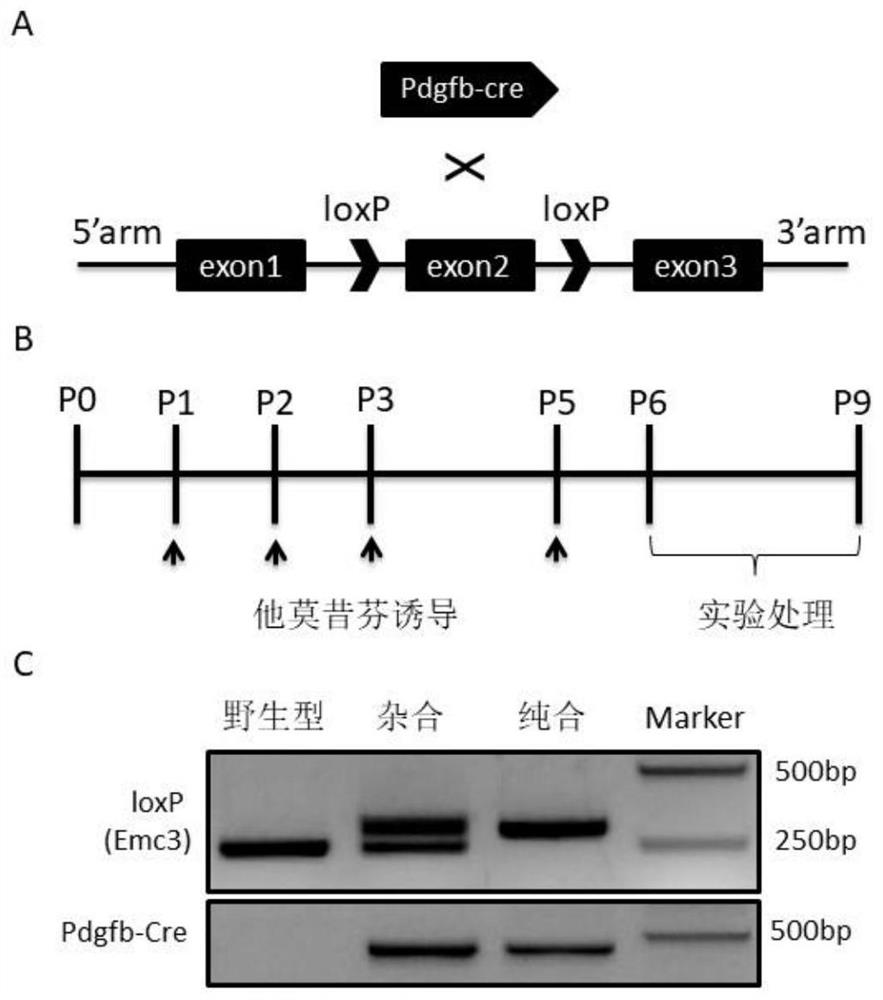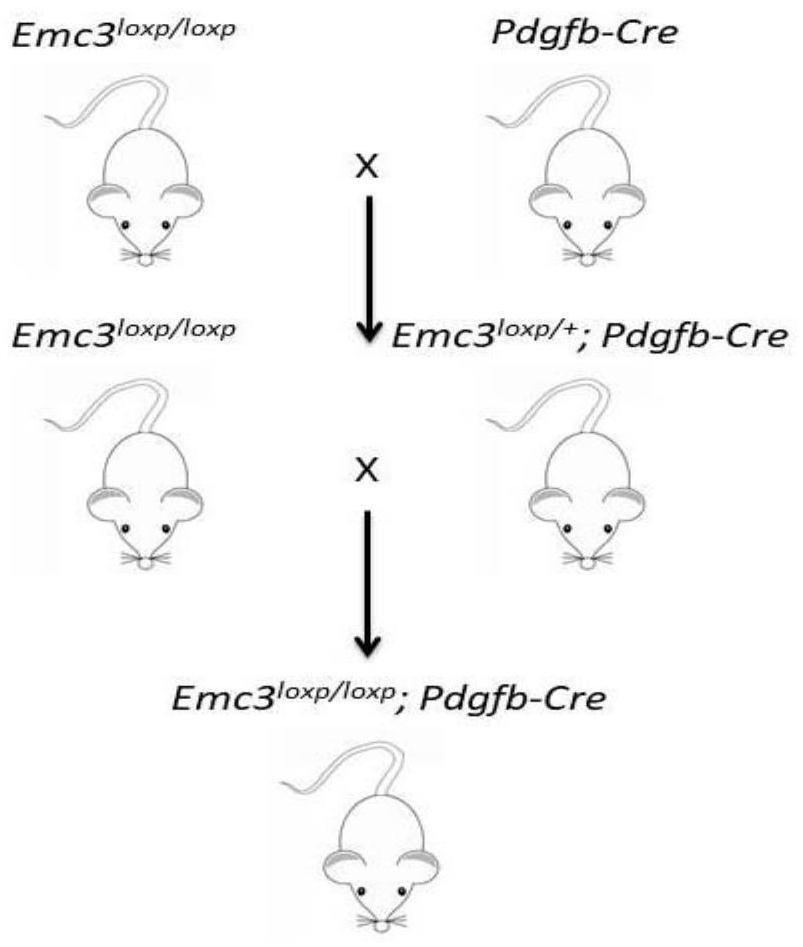Methods and applications for constructing disease models based on gene manipulation strategies
A technology of disease model and genetic manipulation, applied in other methods of inserting foreign genetic materials, animal husbandry, stably introducing foreign DNA into chromosomes, etc., can solve problems such as research, clinical typing difficulties, and diagnosis difficulties
- Summary
- Abstract
- Description
- Claims
- Application Information
AI Technical Summary
Problems solved by technology
Method used
Image
Examples
Embodiment 1
[0078] Mutation of mouse Emc3 gene by CRISPR / Cas9 technology
[0079] 1 Design the gRNA sequence targeting knockout of the Emc3 gene, and obtain the F0 generation of Emc3 gene conditional knockout mice. The gRNA sequence was designed for the second exon region of the mouse Emc3 gene: 5'-CCTTTGTGAAAACCTGTGTGGCA-3'. Synthesize RNA in vitro, microinject into mouse fertilized eggs together with Cas9 protein and repair DNA template, and obtain the first founder mouse (founder) with gene mutation; the schematic diagram of CRISPR design is as follows figure 1 shown. Repair DNA template sequence: the DNA repair template sequence is as follows (SEQ ID NO.1):
[0080]CcttcctcagaaacctttatttgttcagagcccagtcactctggaagactgccttggatccATAACTTCGTATAATGTATGCTATACGAAGTTATggctgtgaaaacctgtgtggcaagttgaatatgtttcattgatttttagggtttttggaaagtttccacacccagcttttgccaaccaggtcctcccttatgtctgagtgggccttctactttacgcttgctttctttgcgtttcacattttaacatctctttgtcttgtgtttttcagTCAGGTCCTAATTCGAAGCAGAGTCCTCAGGGAAAATGGAAAATACATT...
Embodiment 2
[0082] Knockout of mouse Emc3 gene by Cre-loxp gene knockout technology
[0083] 1. Using mice as the target animals, the Cre-loxp conditional knockout system was used to construct a mouse model of retinal neovascular disease.
[0084] (1) mice carrying the loxp sequence (Emc3 loxp / loxp ) is mated with a tool mouse carrying Pdgfb-Cre specifically expressed in vascular endothelial cells to obtain a mouse carrying loxp sequence and Cre at the same time, expressed as Emc3 loxp / + -Pdgfb-Cre, followed by Emc3 loxp / loxp with Emc3 loxp / + -Pdgfb-Cre mice were mated to obtain Emc3 loxp / loxp -Pdgfb-Cre mice ( figure 2 A, image 3 ).
[0085] The mouse Emc3 genome sequence is shown in SEQ ID NO.2. Among them, the 501-825th position is the first exon, the 9346-9403rd position is the second exon, the 9746-9839th position is the third exon, and the 11572-11676th position is the fourth exon, The 12157-12238 position is the fifth exon, the 14192-14271 position is the sixth exon, the ...
Embodiment 3
[0109] Staining of frozen sections of eyeballs and separation of hyaloids.
[0110] (1) Eyeball frozen section preparation: After the mice were killed, the eyeballs were put into 4% PFA solution and fixed at room temperature for 20 minutes, then a hole was made in the center of the cornea with a 30G needle, and the entire cornea was cut off with ophthalmic scissors. The fixed eyeballs were rinsed once with 1×PBS, placed in 30% 1×PBS sucrose solution, and dehydrated at 4°C for 2 hours. Then the lens of the eyeball was taken out, the water was blotted, and the eyeball was placed in a frozen section embedding box equipped with OCT in the same direction, and after being solidified at -80°C, it was stored at -20°C. All sections were 10 μm thick.
[0111](2) Vitreous vessel separation: Take mouse eyeballs, place them in a 24-well plate filled with 4% PFA and fix them at room temperature for 15 minutes, then perforate the cornea and completely remove the corneas, and continue to fix...
PUM
| Property | Measurement | Unit |
|---|---|---|
| thickness | aaaaa | aaaaa |
Abstract
Description
Claims
Application Information
 Login to View More
Login to View More - R&D
- Intellectual Property
- Life Sciences
- Materials
- Tech Scout
- Unparalleled Data Quality
- Higher Quality Content
- 60% Fewer Hallucinations
Browse by: Latest US Patents, China's latest patents, Technical Efficacy Thesaurus, Application Domain, Technology Topic, Popular Technical Reports.
© 2025 PatSnap. All rights reserved.Legal|Privacy policy|Modern Slavery Act Transparency Statement|Sitemap|About US| Contact US: help@patsnap.com



